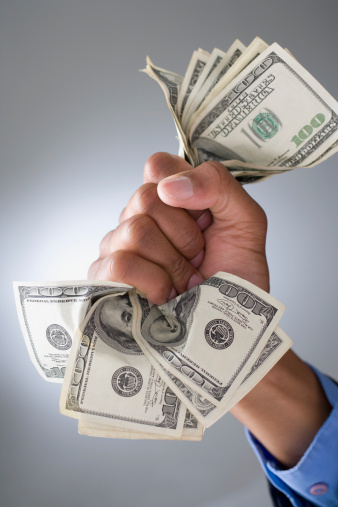Taxes are necessary for a functioning government, but according to one group, many states are crippling regional business growth with tax structures that are too expensive or complex.
The Tax Foundation’s 2014 State Business Tax Climate Index graded all 50 states based on more than 100 measures that reflect how competitive a state’s tax policies are to both large and small businesses. The report considered state income, corporate, property, sales, and unemployment insurance tax policies. As was the case last year, Wyoming had the best business tax climate in the country, while New York had the worst. Based on the Tax Foundation’s report, these are the most tax-friendly states for business.
Click here to see the most tax-friendly states
Click here to see the least tax-friendly states
As might be expected, several of the states rated best for business have among the lowest corporate tax rates in the country. However, several states with much higher corporate tax rates are also among the most tax-friendly for business, according to Tax Foundation data. Alaska and New Hampshire, for example, had the first- and second-highest corporate tax collections per capita in fiscal 2011, respectively, but they still made the list.
States with high corporate tax rates ranked higher overall because they scored much better in other forms of taxes. Alaska levies no personal income tax, while New Hampshire has no sales tax.
The Tax Foundation considered other taxes in addition to corporate taxes because it believes all taxes affect a state’s business environment. Tax Foundation economist Scott Drenkard explained that the report included income taxes, for example, because 94% of all business filings are through this tax, and not corporate taxes.
Drenkard also added that personal income tax and the other taxes considered affect businesses’ ability to attract employees. “Individual income taxes matter because businesses are trying to attract labor to their state. If the choice is between New York City, which has as high as a 12% income tax, and, say, Charlotte, North Carolina, where you have much more moderate income tax burdens, all else equal, people might go with the lower-tax option.”
Another important factor in the rankings is the simplicity of states’ tax codes. One way of ensuring this, Drenkard explained, is by eliminating certain taxes altogether. Of the 10 top-ranked states, eight eschew at least one of the major taxes. Wyoming has no individual income tax or corporate income tax. “Going without one of the individual taxes means that all of that overhead cost, all of that economic waste associated with tax compliance, goes away.”
A review of the states with the best taxes for business does appear to show a healthier economy and lower unemployment. As of August, unemployment was lower than the U.S. rate of 7.3% in eight of the 10 states. Seven of the 10 states with the worst tax policy for business, on the other hand, had higher rates.
However, that the states with best tax climates have stronger economies may have less to do with their tax structure and more to do with abundant natural resources. Wyoming, Alaska, Utah, and Montana all benefit from substantial oil, natural gas, coal, or other mineral reserves. Drenkard noted that this natural advantage is the reason they are able to levy less harsh taxes in the first place.
Not all groups agree with the Tax Foundation’s assessment that higher and more taxes hurt state businesses. Carl Davis, senior analyst at the Institute on Taxation and Economic Policy, said, “The problem is that when you look at taxes in isolation — counting the number of dollars that come in — you miss the reason states are collecting taxes in the first place: to fund government services.”
As an example, Davis gave Maryland, which recently raised the gas tax rate to improve its roads and bridges. “This will likely hurt the state on the Tax Foundation’s business climate rankings, but one of the reasons the state raised the tax was that businesses were clamoring for it,” said Davis. “Businesses recognized that a well-funded infrastructure that’s not falling apart and can get employees to jobs on time and move products around the state efficiently is tremendously important to their bottom line.”
Based on the Tax Foundation’s 2014 State Business Tax Climate Index, 24/7 Wall St. reviewed the 10 states with the best and worst business tax environments. Unemployment rates are from the Bureau of Labor Statistics for August 2013. State debt and revenue figures are from the Tax Foundation for fiscal 2011, the most recent available year. Income, poverty, employment composition, and state expenditure data are from the U.S. Census Bureau’s 2012 American Community Survey.
These are the most tax-friendly states for business.
10. Indiana
> Taxes collected per capita: $2,292 (22nd lowest)
> Unemployment: 8.1% (13th highest)
> Corporate taxes collected per capita: $110 (24th lowest)
> Sales tax rate: 7.00% (tied-2nd highest)
The Tax Foundation rated Indiana’s business tax climate as one of the best in the U.S. after it recently-lowered corporate income tax rate, as well as its low individual income tax rates. As a result, Indiana replaced Texas among the 10 most tax-friendly states for businesses. Additionally, Indiana eliminated its inheritance tax, which also improved its score. The state’s unemployment rate was 8.1% as of August, above the nationwide rate of 7.3%. Still, it was quite an improvement from its recent peak of 10.8% in May 2009, when the recession battered the state’s automotive and construction industries.
ALSO READ: The Most Dangerous States in America
9. Utah
> Taxes collected per capita: $1,958 (13th lowest)
> Unemployment: 4.7% (7th lowest)
> Corporate taxes collected per capita: $89 (19th lowest)
> Sales tax rate: 5.95% (25th lowest)
Utah was awarded some of the top grades in the nation for its property and corporate tax policies, receiving the fourth- and fifth-best scores, respectively, out of all 50 states. Also, Utah’s corporate income tax rate of only 5% is one of the lowest in the nation. As of August, the unemployment rate in Utah was only 4.7%, down from a peak of 8.4% in December 2009 and well-below the national jobless rate of 7.3%. The state’s abundant natural resources, including copper and oil and natural gas, and a vibrant tourism industry boost the economy.
8. New Hampshire
> Taxes collected per capita: $1,761 (8th lowest)
> Unemployment: 5% (9th lowest)
> Corporate taxes collected per capita: $443 (2nd highest)
> Sales tax rate: 0.00% (tied-the lowest)
New Hampshire has a high corporate tax burden, at 8.5% of income. The state collected more corporate income taxes in fiscal 2011 than any state but Alaska. However, the state has no sales tax and only a modest tax on interest and dividends. New Hampshire also offers landowners a nice break in the form of freezes on the assessed value of undeveloped land of a certain size. However, the state still received one of the worst property tax grades in the nation. Per capita collections in New Hampshire were among the highest in the nation, both in dollar terms and as a percent of income.
7. Montana
> Taxes collected per capita: $2,316 (23rd lowest)
> Unemployment: 5.3% (tied-11th lowest)
> Corporate taxes collected per capita: $125 (21st highest)
> Sales tax rate: 0.00% (tied-the lowest)
Montana offers taxpayers low individual income tax rates, a relatively low corporate income tax rate and no sales tax. Montana is among just five states with no general sales tax, although its cigarette and gasoline excise taxes are higher than the majority of states. Boeing, which operates a fabrication plant in Helena, was granted property tax abatements from the city in return for future development. Montana also has one of the nation’s lowest unemployment rates, at just 5.3%, down from a peak of 6.8% in the summer and fall of 2010.
6. Washington
> Taxes collected per capita: $2,566 (19th highest)
> Unemployment: 7.0% (tied-22nd lowest)
> Corporate taxes collected per capita: $0 (tied-the least)
> Sales tax rate: 6.50% (tied-9th highest)
Washington is one of seven states with no individual income tax, which helped improve its score. However, the sales tax, which totals 8.9% when adding in the average local rate, is among the highest in the nation. There have been calls in the past to enact a modest income tax so sales tax and property tax rates can be trimmed. So far, the idea has gone nowhere. The state is also one of just four with a gross receipts tax, under which revenues from corporate transactions are charged. According to the Tax Foundation, such charges often result in high effective tax rates for companies.
5. Florida
> Taxes collected per capita: $1,718 (7th lowest)
> Unemployment: 7.0% (tied-22nd lowest)
> Corporate taxes collected per capita: $99 (21st lowest)
> Sales tax rate: 6.00% (tied-16th highest)
Florida also has no individual income tax, and corporate taxes are modest. The state’s corporate income tax rate is a flat 5.5% and is one of the lower rates in the nation. However, the state is partially penalized by its Alternative Minimum Tax on corporations, which just eight other states charge. Partly as a result of this, 12 other states received better grades from the Tax Foundation on their corporate income tax policies. The state also relies on local sales and property taxes more than most other states. As of fiscal 2011, Florida collected just over $1,700 per capita in taxes, one of the lowest totals in the nation. Of this, more than $1,000 was from sales taxes, one of the highest figures in the nation.
ALSO READ: Ten American Companies Cutting the Most Jobs
4. Alaska
> Taxes collected per capita: $7,708 (the highest)
> Unemployment: 6.5% (18th lowest)
> Corporate taxes collected per capita: $1,003 (the highest)
> Sales tax rate: 0.00% (tied-the lowest)
Alaska is one of six states with no individual income tax. In fact, the state actually gives each resident an annual payment, which is based on the investment earnings from the state’s energy royalties. Alaska has no statewide sales tax, and local taxes averaged just 1.68%. The corporate income tax is relatively high, however. The top rate a company can be charged is 9.4%, one of the highest in the nation. The state is also penalized for having 10 different corporate income tax brackets.
3. Nevada
> Taxes collected per capita: $2,333 (25th lowest)
> Unemployment: 9.5% (the highest)
> Corporate taxes collected per capita: $0 (tied-the least)
> Sales tax rate: 6.85% (4th highest)
Like several of the other states that are the most tax-friendly for business, Nevada has no individual income tax on earnings, dividends or interest. It is also one of just three states that have no corporate income or gross receipts tax. However, the state does have casinos, which are a nearly as lucrative as oil and gas drilling. In 2011, the state made $865 million just in taxes on gambling from casinos, roughly 5% of the state’s total revenue and far more than any other state. The state’s ability to raise revenue from gambling was threatened during the housing crisis and recession, during which the state’s budget deficit reached more than 54% of spending.
2. South Dakota
> Taxes collected per capita: $1,682 (3rd lowest)
> Unemployment: 3.8% (2nd lowest)
> Corporate taxes collected per capita: $19 (5th least)
> Sales tax rate: 4.00% (tied-7th lowest)
South Dakota has long been a major agricultural producer. In the 1980s, however, it changed its banking and tax laws to attract credit-card operations, with companies like Citigroup having a strong presence there. The state’s economy gets a boost from Federal government spending. Ellsworth Air Force Base, near Rapid City, is one of the state’s largest employers. South Dakota has no individual income tax or corporate income tax. It does, however, levy a franchise tax on financial institutions. The state’s flat sales tax of 4% is one of the lowest the country. Adding average local sales taxes, it it the ninth-lowest effective sales tax in the U.S.
ALSO READ: The Least Tax-Friendly States For Business
1. Wyoming
> Taxes collected per capita: $4,347 (3rd highest)
> Unemployment: 4.6% (tied-5th lowest)
> Corporate taxes collected per capita: $0 (tied-the least)
> Sales tax rate: 4.00% (tied-7th lowest)
Wyoming has had the best tax climate in the nation for each of the last three years. The state charges no individual income tax, and as a result is tied with the six other states for individual income tax policy. Additionally, the state is one of just three, alongside Nevada and South Dakota, with no corporate income tax or a gross receipts tax. Oil, gas, coal and other minerals provide much of the state’s total provided close to $1 billion a year in severance tax revenue, charged when nonrenewable resources are extracted, to the state as of 2011.
Get Ready To Retire (Sponsored)
Start by taking a quick retirement quiz from SmartAsset that will match you with up to 3 financial advisors that serve your area and beyond in 5 minutes, or less.
Each advisor has been vetted by SmartAsset and is held to a fiduciary standard to act in your best interests.
Here’s how it works:
1. Answer SmartAsset advisor match quiz
2. Review your pre-screened matches at your leisure. Check out the advisors’ profiles.
3. Speak with advisors at no cost to you. Have an introductory call on the phone or introduction in person and choose whom to work with in the future
Get started right here.
Thank you for reading! Have some feedback for us?
Contact the 24/7 Wall St. editorial team.


